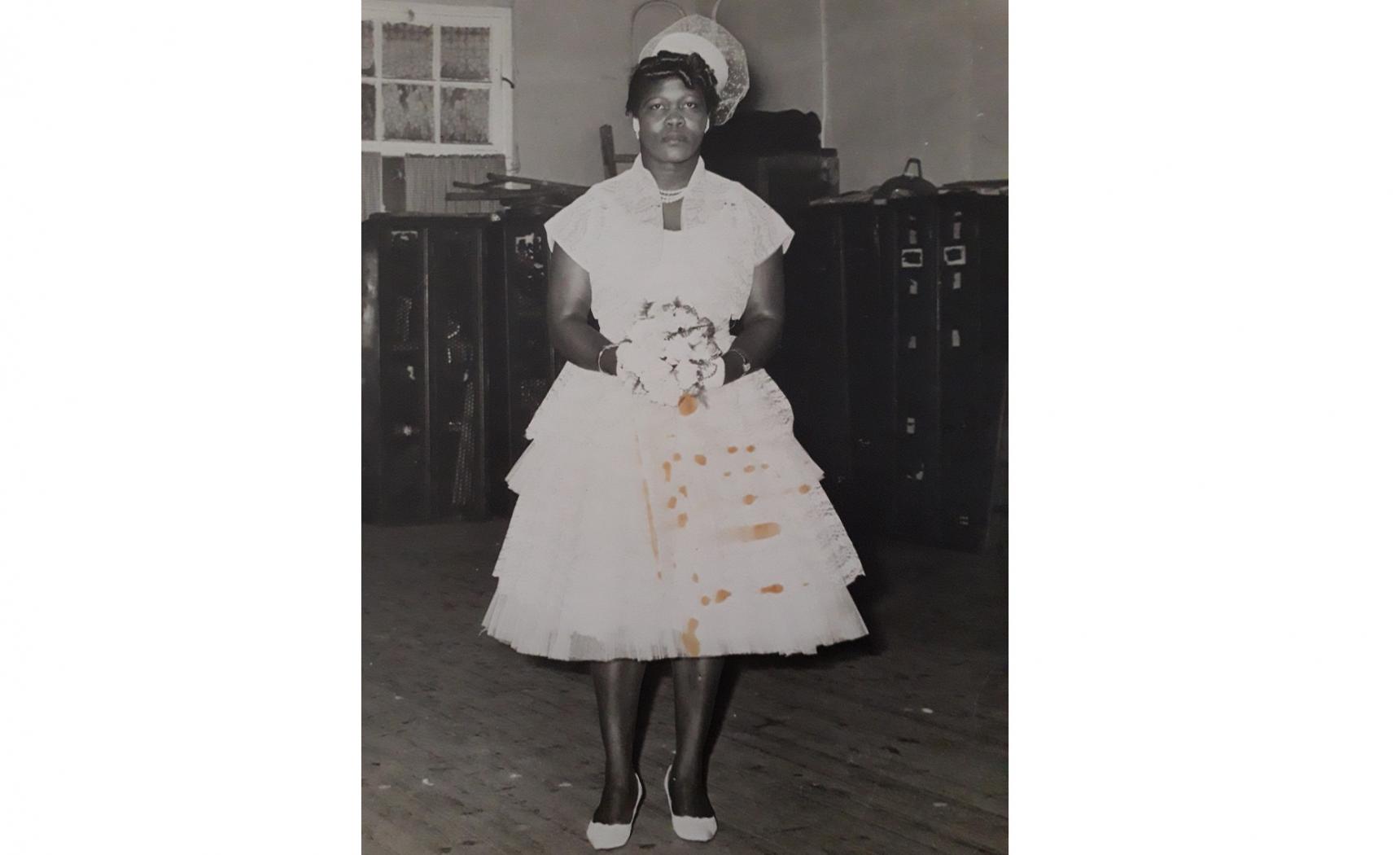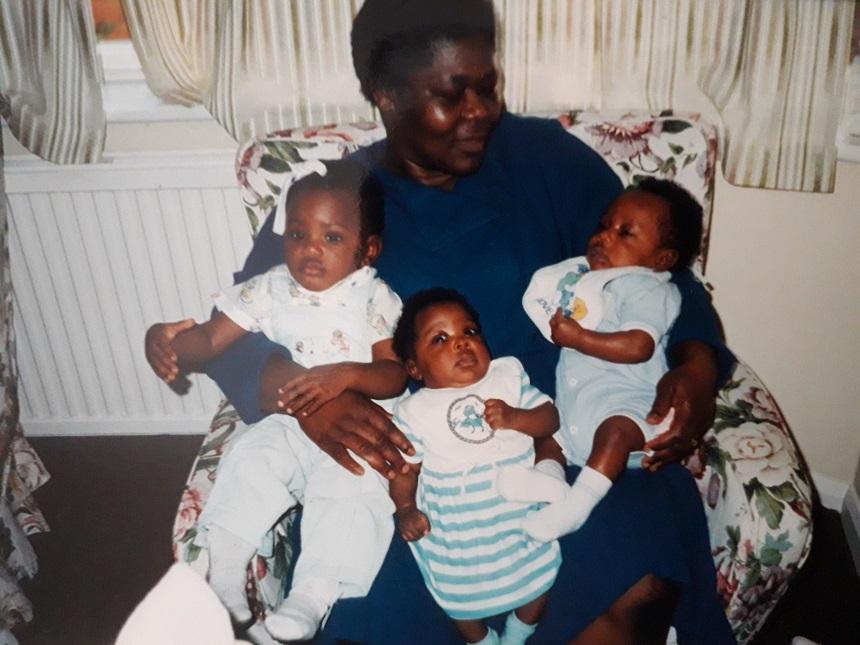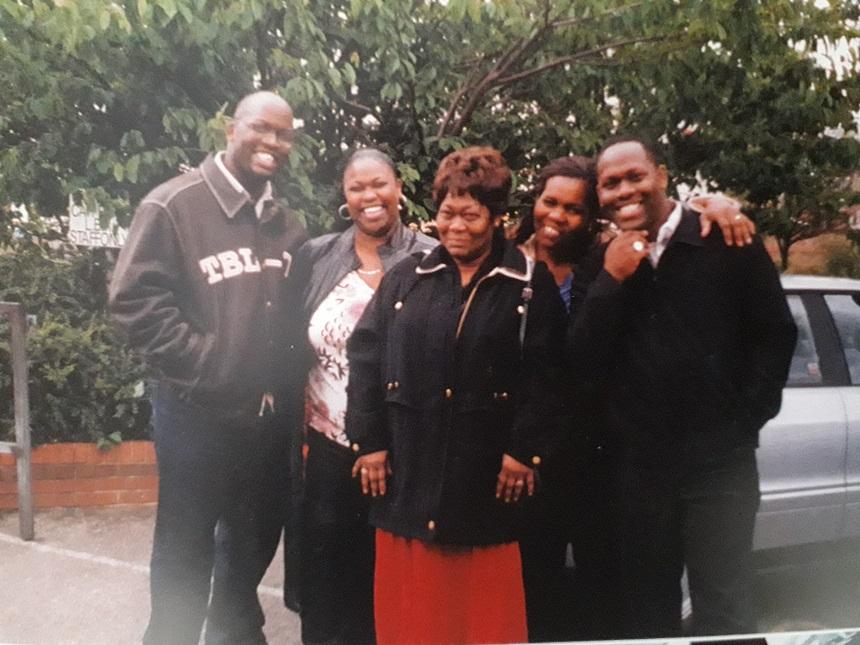
Real stories
‘For Mum, singing was like healing. In her culture and generation, people didn’t often discuss their problems’
In July, Acceptance Abraham, 80, from London gave Alzheimer’s Society an interview for this year’s Black History Month. Tragically, she died from COVID-19 just six weeks later. Her daughter Nola has allowed us to publish the words Acceptance had already agreed, followed by a tribute of her own.
I am a people person. I love life. I love people. It doesn’t matter if you are Black, white, pink or green. I love you for who you are. You are part of creation – just like me.
I was born on St Vincent, and my parents were successful farmers. They grew sugarcane, arrowroot, cotton, sweet potatoes, bananas, yam.
My Mum had eight children - six girls and two boys, and I was the youngest.
Religion and rebellion
When I was a child, I was brought up Anglican – the same as my mother.
I wasn’t very religious then, but my Mum sent me to Sunday School. And they gave you a bible verse every week to memorise. You had to recite it in front of the class. A lot of that stuck with me.
When I was about 12, I got rebellious. My Mum said I had to help out on the farm, and not go back to school in September. And I cried so much. I was so angry, I didn’t care.
I had a baby at 16. So I was rebellious, but I was naïve as well.
Looking back, I had to go through that. That was my journey.
I had six children. I told them I learned nothing easy. I learned the hard way.
Leaving for England
When I was 20, all my brothers and sisters had left home and went to Trinidad or the US. I was the only one left.
So in 1961, I left for England. At the time, the door was open. The country was needing help. And I wanted to see England and if it was like what they said in my school books.
‘It was my destiny to come here.’

Acceptance pictured on her first day in England
I went to Buckinghamshire – High Wycombe. There were people already there from my village in St Vincent. They looked after me. They all gave me money.
I remember having a tough time at the markets. I saw the cucumbers, but I only recognised them when they were cut open.
In St Vincent, the cucumbers grew as fat as your arm. I couldn’t believe how small these were here. And it was the same with the tomatoes. Back home they were massive.
I ended up doing factory work first and then worked in a canteen. It was there that I got used to the English accent. I couldn’t understand what people said before.
Discovering spirituality
When I came to England, I felt self conscious about going to Church. They would all be saved and they would be looking for a sinner to convert. And I didn’t like that role too much.
But one night I had a dream. I was back in St Vincent, and there was a flood, and I saw myself being swept away by the flood. When I woke up my heart was beating so hard, I thought it might jump out of my clothes. It was 1967. That was when my whole life changed – I gave myself to God.
I am spiritual, but I wouldn’t call myself religious. I think religions are too suffocating. I don’t think there is space enough to grow as a human being.
So I found a circle of like-minded people who gave me time and space to be myself.

Acceptance with three of her grandchildren
Living with dementia
I had a stroke in 2017, and that’s when dementia comes in. I know that my brain has slowed down from this stroke. Sometimes I want to say a word and it doesn’t come. I can’t write like I used to. And I am always falling over.
In May, I had a bad fall, and I am still unsteady on my feet.
I loved going out to Alzheimer’s Society’s Singing for the Brain. I love singing. It gives me a chance to express myself. And it is wonderful to do it with people. Those meetings were special.
But then coronavirus and lockdown came – that was a monster.
Three things helped me get through it. Firstly, every day I read something. Not as much as I used to, but a little - anything spiritual.
Second, I communicate – that is what keeps me sharp. Having people around. People phone me from around the world. Sometimes I end up on the phone the whole day.
Finally, I know my spirituality has helped me survive.
I was born to serve. As a child, at school, we would go on a trip, and my Dad would say, ‘Why is your bag heavier than everyone else’s?’
And I said, ‘Well, it’s good to have something to share.’
Even now I still put sweets in my handbag, just in case. That’s who I am. I love the simple things.

Acceptance with four of her children in the 1990s
Nola Morgan, Acceptance’s daughter, writes:
What my mother writes here, that was her truth. But there is a bit more that I think needs to be said.
Since her stroke, Mum was in a lot of pain. I could see her deteriorating physically. But at the same time, I know she had a lot of happiness in this period.
She never let her poor health make her grumpy. She would laugh regularly, and the times when she got to go out – for instance to Singing for the Brain, or to see her friends and family, gave her real joy - even when she was on crutches!
She truly loved singing. She even wrote her own songs.
Singing was a type of therapy for her. In her culture and her generation, people didn’t often discuss their problems.
It was a shame to talk about the problems you were enduring. And so Church was the place where people poured out their sorrow, and they did it through song.
For Acceptance, singing was like healing. I think that was why she appreciated Alzheimer’s Society and Singing for the Brain so much.
As a family, we looked after each other. Mum was supportive of me at the lowest points in my life. In recent years, my daughter, Zara, went to do Mum’s shopping every fortnight. We were all part of each other’s life.
I will miss Mum for who she was.



Stanley Copland
saysMy Mum thought everybody was good. She couldn't see badness in anybody. She never swore & was so honest.Unfortunately she got dementia & eventually had to go in to a home
which was very sad but the owner's Wife's mother had had dementia & understood it & treated my Mum very well. They would give my Mum a duster and she would dust around. No matter if she dusted the same thing over & over.
Mum new my Wife and myself to the end which was wonderful. We both loved her very much.
She was one reason that I try to fight for good treatment of dementia sufferers.I
That & the fact that they should be treated as well as they can be and we should continue to try to find a cure.
Caroline
saysIt was lovely to read Acceptance's story - you can feel her contentment with life, despite the ups & downs. She reached out to me. I'm sorry for your loss - made even sadder by her having Covid. Be kind to your self - she is with you. My own Mum (89) is in Ireland in a home, with dementia and now cancer - I was only able to see her twice last year as couldn't travel. I try now to go as often as possible.
Glenn
saysIt was always a pleasure to lead the Singing for the Brain sessions that Acceptance came to and enjoyed so much. She always brought a special joyful energy, and could hold the room in the palm of her hand like a particularly wise and chucklesome preacher. Our group won't be the same without her warmth, calmness and laughter. But we are all better and happier people for knowing her.
Wini,Fred Hodder
saysMy sister in England has just gone into a home with alziemers with this covis i havnt seen my family for two years as I live in northan ireland.
I looked after my Partner with Alziemers it was very hard to see someone you love suffer .
Richard Horsford
saysA great woman. A great mum, a firm hand, a caring heart. She was like my second mum. When I met her through my friend Tim her son I was always a pleasure being in her company. She cared and spoke to me like her own, cared for like her own and was the healing balm when things weren’t always right between me and Tim and was that light in times of trouble. Now she has gone to rest in the Light. Her soul may rest but her spirit and legacy will always live on I’m what she has sown in us.
Jools.
saysYour mum was lovely,we watched her on the show. Such a character.
My mam too had this horrible disease and we have just watched her die 3 days ago. I feel like my heart has been ripped out and trampled on. Our love and prayers are with you and your family.
Ruth
saysOur Mum had dementia too but she was nearly always happy. She loved being with people and helped so many people in her life. Colouring and making up stories about the pictures took up her time and during lockdown when we couldn’t see her her Carers were brilliant and she would tell us many times about her pictures. Who cares if she repeated herself she was happy.
Yes it is a cruel thing but Mum was still Mum x
It’s good to hear other people’s inspiring stories Thankyou.😊
Alessandro
saysSurely, singing is therapeutic for people suffering from Alzheimer' type of Dementia. I 've been working as musictherapist in a nursing home in Italy since a long time, and during my singing groups I could realize how singing can positively change their mood, sociality and communication. They may have difficulties in verbal languages, but some of them may remember and sing along the lyrics of old songs related to their youth.
Danielle, daughter of Kathleen (74yo with Dementia)
saysWow. She clearly lived up to her name - Acceptance. Throughout her story you can hear acceptance for each, and every, milestone she encountered. My deepest condolence to the family and friends of Acceptance.
Joyce Kernohan
sayseverytime one reads a little story of someone suffering from this disease it helps to better understand how to cope with it, There is always something new to learn how to cope with it when a loved one has it, too late now for me as my dear husband died in June last and I wish I had more understanding of it then, I miss him so much
Anonymous
saysWe're very sorry to learn about the loss of your husband, Joyce.
Please do call our Dementia Connect support line on 0333 150 3456 if you ever need someone to talk to. More details about the support line, including opening hours, are here: https://www.alzheimers.org.uk/dementia-connect-support-line
You might also benefit from joining our online community, Talking Point, where carers and other people affected by dementia can share their experiences and receive peer support. It's free to join, and open day or night: https://www.alzheimers.org.uk/get-support/dementia-talking-point-our-on…
Please do call our support line if you need us, Joyce.
Alzheimer's Society blog team
Sue McFarlane
saysYour mum bless her reminds me of my mum. She has dementia and Alzheimer’s and is 94 years old. We are finding she does drift off. But loves music and to see us dance. We hang onto her every work when she talks about coming to England in 1958 even though we have heard the stories many times over the years we act surprised and watch her eyes light up. Thank You for sharing this brought a smile to my face. Xx
LOUISE CUMBERBIRCH
saysMy mother In law with mixed dementia loves our You tube time. Brings her back for a while. Thank you very much for sharing her story.
An
saysAcceptance sounds so lovely I wish I could have met her!
LdS
saysThank you for sharing your mum's story. It's resonated with me as my parents also came over in the 60's and religion was something that kept them strong in their weakest of times. My mum also had dementia in her final years, but her joy was her hymns and her family. May our parents rest in peace.
Jane Brinsmead
saysAcceptance was clearly a wonderful , loving and caring lady right up until her passing. How lucky her family have been to have had her in their lives